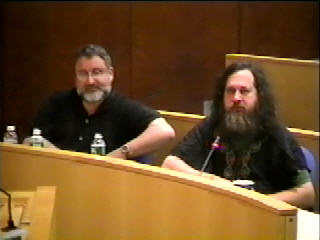

Photo source: Professor Conrad Johnson
Dear FSF licensing folks,
As discussed earlier in IRC (freenode), I have been pursuing answers from Red Hat regarding an urgent matter. I previously interviewed their CEO regarding patents and last week I spoke to a fairly senior person from Red Hat (unnamed for his own protection), for the third time this month. I wrote about 10 articles on this subject and it led to others writing about it as well, including some prominent bloggers.
"We need to understand what Red Hat agreed on with Microsoft on as Microsoft can use this behind closed doors against other companies, for pressure/leverage."To put it concisely, Red Hat signed a deal with Microsoft which not only involved technical work but also what they call patent "standstill". Who is this "standstill" for? Apparently Red Hat and its customers. I strongly doubt, especially in light of Alice v. CLS Bank, that a "standstill" should be needed. Red Hat does not threaten to sue Microsoft, whereas Microsoft did in the past threaten Red Hat (even publicly). This leaves those outside Red Hat in an awkward position and ever since this deal I have taken note of at least two companies being coerced by Microsoft using patents (over "Android" or "Linux" [sic]) or sued by one of its patent trolls, e.g. Intellectual Ventures. This isn't really a "standstill". It's more like the notorious "peace of mind" that Novell was after back in 2006.
Red Hat has also admitted to me that it is still pursuing some software patents in the USPTO -- a fact that does not surprising me, especially given the soaring market cap of RHT and the growing budget. This serves to contradict what people like Rob Tiller say to the courts; it shows double standards and no principled lead by example.
"The analysis and the voice of the FSF may be needed at this stage."I have asked the FSF's Joshua if it had looked into the patent agreement between Red Hat and Microsoft. Their lawyers in this case, Mr. Piana and Mr. Tiller (probably amongst others whom we don't know about yet), would probably claim and even insist that it's GPL-compatible, but the wording in the FAQ make it look exclusionary and there's no transparency, so one cannot verify these claims.
We need to understand what Red Hat agreed on with Microsoft on as Microsoft can use this behind closed doors against other companies, for pressure/leverage. I am genuinely worried and fellow journalists who focus on GNU/Linux (Sean Michael Kerner for instance) tell me that they are too.
The analysis and the voice of the FSF may be needed at this stage. I have politely urged Red Hat for a number of weeks to become more transparent, whereupon some in the company said they had escalated these requests, but evidently nothing is being done, hence I feel the need to turn to the FSF.
I would gladly provide additional information that I have upon request.
With kind regards,
4. Does the new partnership address patents?
Red Hat and Microsoft have agreed to a limited patent arrangement in connection with the commercial partnership for the benefit of mutual customers.
The heart of the arrangement is a patent standstill that provides that neither company will pursue a patent lawsuit or claim against the other or its customers, while we are partnering. Neither company acknowledged the validity or enforceability of the other’s intellectual property; it is not a patent license or a covenant not to sue and no payment was made or will be made for intellectual property.
The partnership is between commercial companies related to their common customer offerings, spurred by customer demand. Both parties carefully designed for FOSS licensing compliance in building the arrangement and each party’s relationship to the FOSS community stands on its own.
“Covering only customers and not downstream users is not a good thing, but it may not do a lot of harm.”
--Richard StallmanI responded by saying "I hope that a thorough look into it will help remove uncertainty and get some hard answers. Right now it's too vague or me and some fellow developers to conclude anything from."
Days ago I asked whether "there been any progress on this case" because "I just want[ed] to be sure that licensing is looking for answers regarding the matter."
Stallman, by that stage, seemed to have already spoken to a colleague and friend. "Eben Moglen," he explained, "told me it doesn't violate GPLv3. Other than getting that information, I don't know what progress we could hope for."
Well, as GPLv3 co-authors, their take on this sure counts. We therefore got an answer without taking a look at the contract itself (they had made access to it highly privileged information).
Assuming the case won't go any further than this, we believe it helps set the record straight on the Microsoft-Red Hat situation. ⬆